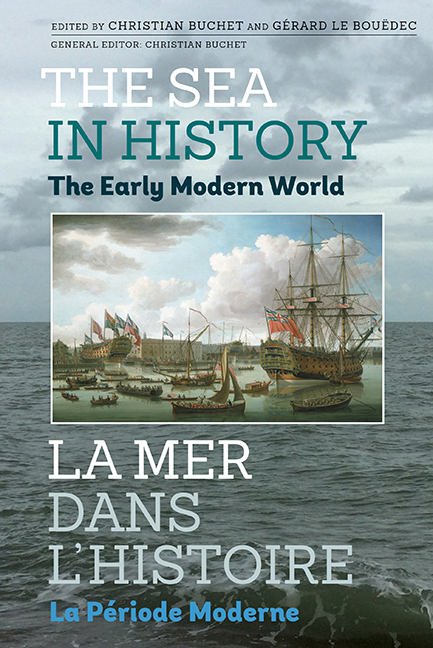Book contents
- Frontmatter
- Contents
- List of Illustrations
- List of Contributors
- Introduction générale et remerciements par
- General introduction and acknowledgements
- Introduction (français)
- Introduction (English)
- LA RÉUSSITE PAR LA MER:La reussite par la mer des territoires et des communautés littorales
- La construction d'un espace mondial: La circulation maritime et les ports
- La forte croissance de l'économie des pêches et des échanges
- Les acteurs de la dynamique maritime
- LA PUISSANCE MARITIME INSTRUMENT DE LA PUISSANCE POLITIQUE ET D'UNE STRATÉGIE GLOBALE DE RAYONNEMENT VOIRE DE DOMINATION: Les puissances maritimes occidentales
- L'océan Indien, entre convoitises et indifférences
- Les puissances maritimes asiatiques
- L'Afrique
- La politique maritime et l'idéologie
- Mer et développement technologique
- Développement maritime et maîtrise économique et financière
- Développement maritime et maîtrise organisationnelle
- Conclusion (français)
- Conclusion (English)
- Conclusion générale par
- General conclusion by
- Miscellaneous Endmatter
- Miscellaneous Endmatter
Introduction (English)
Published online by Cambridge University Press: 11 May 2017
- Frontmatter
- Contents
- List of Illustrations
- List of Contributors
- Introduction générale et remerciements par
- General introduction and acknowledgements
- Introduction (français)
- Introduction (English)
- LA RÉUSSITE PAR LA MER:La reussite par la mer des territoires et des communautés littorales
- La construction d'un espace mondial: La circulation maritime et les ports
- La forte croissance de l'économie des pêches et des échanges
- Les acteurs de la dynamique maritime
- LA PUISSANCE MARITIME INSTRUMENT DE LA PUISSANCE POLITIQUE ET D'UNE STRATÉGIE GLOBALE DE RAYONNEMENT VOIRE DE DOMINATION: Les puissances maritimes occidentales
- L'océan Indien, entre convoitises et indifférences
- Les puissances maritimes asiatiques
- L'Afrique
- La politique maritime et l'idéologie
- Mer et développement technologique
- Développement maritime et maîtrise économique et financière
- Développement maritime et maîtrise organisationnelle
- Conclusion (français)
- Conclusion (English)
- Conclusion générale par
- General conclusion by
- Miscellaneous Endmatter
- Miscellaneous Endmatter
Summary
Is the sea a factor of success, of development, of influence? That is the fundamental question that led a group of authors from every continent to embark upon this editorial adventure. Success by sea can be considered on two levels: that of economic and social development, since the sea can make all the difference between territories and societies – even though in certain parts of the world (Oceania) the bond with the sea was a purely organic, existential link, with no ambition of success; and that of power, since the influence of a state (which may be too precise a term, covering as it does more informal entities as well) is often considered incomplete if it does not include a strong maritime dimension, whether the latter be related to food, trade, industry, or a navy that is the instrument of domination or hegemony.
How a state's uses of the sea may further the instruments of sovereignty and domination quickly became a major focus of the study. Can hegemony, that highest level of domination, only be reached by those states which can avail themselves of the widest range of activities, and by those which manage to combine all the factors required to develop fleets, men, shipyards, and technological innovation, and control economic and financial movements? From the 15th to the 18th century, various small countries based their existence, their unity, their development, and their very nation building on an outward-looking, colonial economy and a maritime strategy before some dominating states, whose maritime power spearheaded their expansion, asserted themselves more fully. It thus seemed important to observe the paths of these various societies to better understand how some went from dense maritime activity to maritime power before reverting to a state where the sea is viewed once more simply as an economic and social driver, while other countries retained their maritime power over a longer period, even when their military capacity no longer reflected the declining reality of trade and fishing activity. Finally, how were some countries able to develop naval power even though they had little access to the sea? Were success and domination by sea only possible for states which had reached a certain level of economic, political and social modernity?
One way or another, it was advisable to start by observing various uses of the sea, since a country's relationship to the sea plays a fundamental role.
- Type
- Chapter
- Information
- The Sea in History - The Early Modern World , pp. 4 - 6Publisher: Boydell & BrewerPrint publication year: 2017

